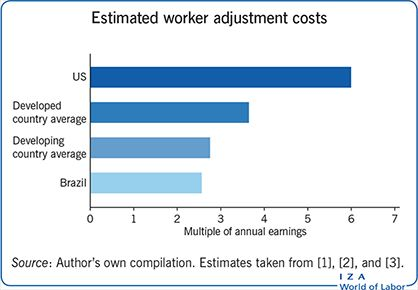Elevator pitch
Economists have shown that international trade increases economic growth, with trade liberalization and integration having characterized the last 50 years. While trade can increase national welfare, recent estimates from both developed and developing countries show that labor market adjustment costs matter. Regulating trade, defined as adding or removing tariffs and other trade barriers, is not the best way to help lower-income workers who suffer from trade-induced losses. Policies that reduce adjustment costs may increase aggregate welfare more than regulating trade flows does.

Key findings
Pros
- Trade increases national welfare by lowering prices for consumers, adding product variety, and contributing to economic growth.
- If part of a selective and proactive industrial policy, regulating international trade can help developing countries support exporting firms and workers.
- Reducing adjustment costs can increase the welfare gains from trade in both developed and developing countries.
Cons
- Trade liberalization leads to reallocation of workers and resources across sectors and therefore imposes significant adjustment costs on workers.
- Even if trade liberalization increases national welfare, the costs can be highly concentrated geographically.
- Regulating international trade to recover lost jobs may not be effective because mobility costs are significant.
- Failure to address concentrated losses can undermine popular support for trade.
Author's main message
While trade increases national welfare, its liberalization can impose significant and concentrated costs on workers. These costs are often born disproportionately by certain segments of society, which has created a groundswell of anti-globalization in many countries, as evidenced by the UK’s exit from the EU (Brexit) and the US withdrawing from or renegotiating key free trade agreements. Reducing adjustment costs would be a more effective policy to boost employment than trying to restrict trade. In developing countries, however, carefully managed trade regulation can play a key role in supporting firms and workers in ways that contribute to economic growth.
This article first appeared on IZA World of Labor in June 2018. Reproduced with permission


